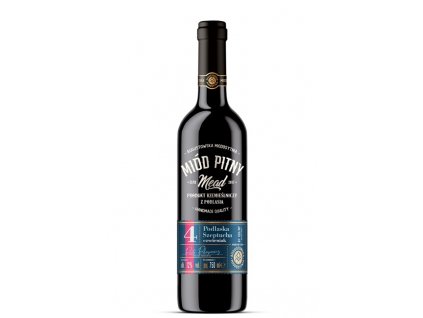Semi-dry fresh cherry mead from Poland. Light red color, cherry aroma, dry taste with clearly perceptible honey and a delicate oak flavor.
The mead is made in the style of the previously known Wisniak, in which 1/3 of the water is replaced by fresh cherry juice. The added pepper gives a slightly spicy, unique taste.
The original Polish mead Czwórniak contains 25% honey.
mead
Mead is an alcoholic beverage fermented from honey and water, with possibility of addition of other ingredients such as spices or herbs or in combination with fruit juices.
Melomel
Melomel is a fruit mead with is fermented from honey and fruit juices.
Production process
This mead was boiled before fermentation. The thermal process has certain technological advantages, however, some valuable components of honey are damaged, especially during prolonged boiling. You will not recognize the production process in taste, but it is typical for boiled mead that they are more golden in color because honey partially caramelize at high temperatures.
Awards
Awarded a bronze medal in the Mead Madness Cup 2019 and Mead Madness Cup 2020 PRO
Producer Augustowska Miodosytnia
Founders Piotr Piłasiewicz and Paweł Kotwica decided to reborn mead production in north-eastern Poland based on the traditions of the Polish-Lithuanian region. They come with interesting types of mead
Founders Piotr Piłasiewicz and Paweł Kotwica decided to restore the production of mead in north-eastern Poland, based on the traditions of this Polish-Lithuanian region. They come with interesting types of meads.
The idea of creating Augustowska Miodosytnia was born from our involvement in the revival of beekeeping and the willingness to share experiences with home mead production. As with beekeeping, honey production is a beautiful old Polish tradition, pushed out of the market and public awareness by the popularization of more economical forms of production. We opened Augustowska Miodosytnia to produce the highest quality mead in the traditional way, using only natural ingredients obtained from the Augustów forest and neighboring areas. We allocate part of the profits to the development of beekeeping by supporting the activities of the Bartne Brotherhood, from which we originate. Our mead recipes are derived from the rich tradition of mead production in the Polish-Lithuanian Commonwealth. We want to recreate the tastes that pleased our ancestors. According to this principle, we were the first in Poland to start the production of the forgotten Zbiceń.
The proper production of mead begins with dissolving the honey in the appropriate amount of water for the given recipe. It is then heated and cooked with spices and seasonings. This is how honey wort is produced, which is then pumped into a stainless steel fermentation tank, stirred intensively and, after cooling, yeast is added. After the first phase of fermentation, i.e. after approximately 3-12 weeks, depending on the type of honey (after the so-called turbulent fermentation), the honey goes into the next phase of production, during which it matures calmly, clears and acquires "character" over time. It takes 3 to 12 months. The honey is bottled when both laboratory tests and organoleptic tests confirm its correct "strength", as well as taste, color and aroma. Approximately 1,300 bottles of alcohol are produced in one production process. For example - we need a whole year to produce Trójniak. We don't want to speed up the natural processes because we know that good drinks are worth waiting for.










